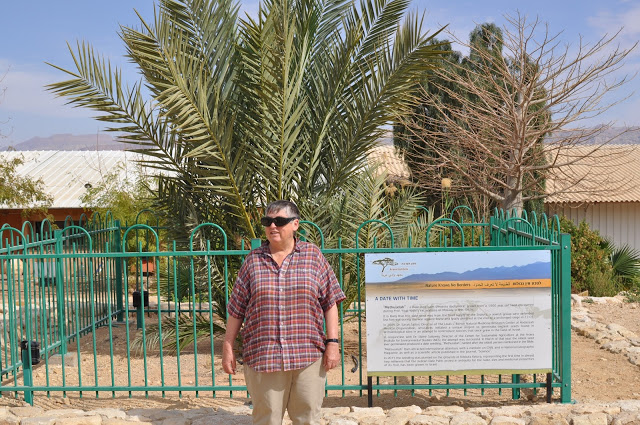Photo: Anne Taillandier Dr. Elaine Solowey and her masterpiece, the Methuselah tree. |
Remarkable research and innovation is taking place at the Arava Institute for Environmental Studies, or AIES, a JNF partner that promotes professional cross-border scientific cooperation in the Middle East. Just one example of an AIES advancement: the date palm that an Arava Institute scientist successfully grew from a seed thousands of years old. Never heard of it? Read on for more on this amazing, one-of-a-kind tree.
Methuselah is considered to have been the oldest living man in the Hebrew bible, reaching the esteemed age of 969. It is only appropriate, then, that a date palm that sprouted from a 2,000-year-old seed at southern Israel's Arava Institute for Environmental Studies (AIES) carries the same name.
Dr. Elaine Solowey, director of the Center for Sustainable Agriculture at AIES and an expert in crops appropriate for arid lands, was very skeptical about the possibility of taking ancient seeds and producing something viable from them. With only six seeds, recovered by the Louis L. Borick Natural Medicine Research Center of the Hadassah Medical Organization from excavations at the Masada fortification in the 1960s, she set out to cultivate a Judean date palm. While native to Israel and the area surrounding it, the Judean date palm is a species that had not been seen there for more than a millennium.
Seven years ago, a male date palm sprouted from one of those ancient seeds, leaving many in awe of what was thought to be a botanically impossible feat.
Photo: Anne Taillandier Methuselah, right, in its natural habitat at Kibbutz Ketura in the Arava. |
"It has become a major attraction here at the institute," AIES Executive Director David Lehrer said regarding the now-mature Methuselah at its home on Kibbutz Ketura. Lehrer explained that AIES’s dream is to reintroduce the Judean date palm to the State of Israel as a valuable crop and for its unique medicinal properties.
This initiative and other AIES agricultural projects are made possible by the institute’s partnership with Jewish National Fund (JNF). Together, JNF and AIES are turning the world’s attention to the knowledge and research coming out of the Negev desert, with a focus on the fields of hyper-arid nature conservation and water management.
More on the Arava Institute
Water trip through Israel gives students hope for a dry, troubled region
Watershed moment: Israelis, Palestinians, Bedouin team on Negev water quality
Methuselah is actually part of a larger project organized by Solowey, and with this success she plans to create a center for the study of ancient, extinct, and endangered seeds. Dr. Solowey is therefore looking for a female seed to procreate with Methuselah, thereby continuing the species. Quite literally, she is looking for its basheret, and to that end, the JNF is doing its part to help make a match. Know anyone?
"We want to make sure that endangered plant species don’t disappear from Israel's landscape,” Lehrer said. "We are looking for good uses for native plants which are under threat,” he added, emphasizing the plants’ medicinal qualities. "In some ways, nature is under threat,” Lehrer said. “It’s important that human beings remember that our role in this world is to continue to nurture nature and to 'take care of the garden.' The bible tells us that if we ruin it, there won’t be anyone to come after us and fix it."
A version of this article was originally posted on JNS.org.


